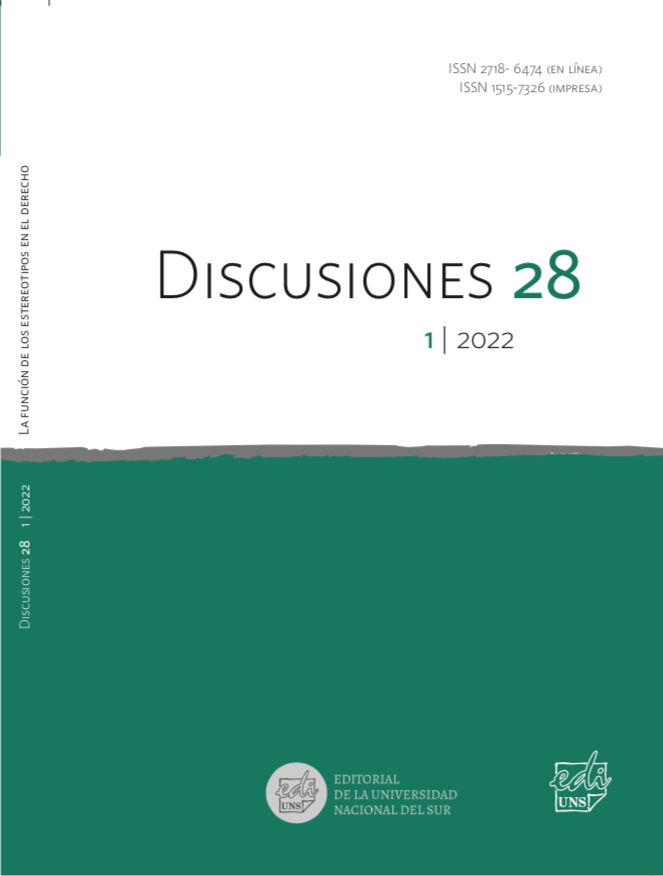Dominic Ongwen at the International Criminal Court: A feminist analysis on international crimes and complex subjectivities in war
DOI:
https://doi.org/10.52292/j.dsc.2022.3338Keywords:
Dominic Ongwen, Feminist Theory, International Crimes, International Justice, AtrocitiesAbstract
In February 2021, the International Criminal Court convicted Dominic Ongwen, a former child soldier and later commander of the Lord’s Resistance Army (LRA), on 61 counts amounting to crimes against humanity and war crimes committed between 2002 and 2005 in Northern Uganda. In this article, I reflect on the crimes attributed to Ongwen by the Court and on his status as a victim-perpetrator. I thus scrutinize what is said and silenced in the judgment from a gender and feminist perspective. I will defend the thesis that the case opens a new reflection opportunity on the paradoxes of the punitive drive of the international feminist struggle, and on the difficulty of overcoming radical binaries within the realm of international criminal law.
Downloads
References
Allain, J. (2021). Amicus Curiae Observations on the issue of Sexual and Gender-based Crimes: Sexual Slavery & Forced Marriage. La Haya: Corte Penal Internacional.
Ardila, M., Ibáñez, M. C., Fernández-Paredes, T., Kravetz, D., SáCouto, S. y
Seoane, D. (2021). Amici Curiae Observations on Sexual- and GenderBased Crimes, Particularly Forced Pregnancy, and on Standards of Proof Required for Sexual and Reproductive Violence Pursuant to Rule 103 of the Rules of Procedure and Evidence. La Haya: Corte Penal Internacional.
Armitage, C. (2015). The residuals of colonial rule and its impact on the process of racialisation in Uganda. CERS Working Paper, 1-11. Obtenido de: https://cers.leeds.ac.uk/wp-content/uploads/sites/97/2016/04/ The-residuals-of-colonial-rule-and-its-impact-on-the-process-ofracialisation-in-Uganda-Colette-Armitage.pdf
Ashraph, S., Barbour, S., Campbell, K., Kather, A. L., Kestenbaum, J. G., Marcus, M., Yang, H. (2021). Observations on Sexual- and Gender-Based Crimes, Particularly Sexual Slavery, and on Cumulative Convictions Pursuant to Rule 103 of the Rules of Procedure and Evidence. La Haya: Corte Penal Internacional.
Baines, E. K. (2009). Complex political perpetrators: reflections on Dominic Ongwen. The Journal of Modern African Studies, 47(2), 163-191.
Baines, E. K. (2014). Forced Marriage as a Political Project: Sexual Rules and Relations in the Lord’s Resistance Army. Journal of Peace Research, 51(3), 405-17.
Baines, E., Brouwer, A.-M. d., Bunting, A., Volder, E. d., Maloney, K. M., O’Brien, M., . . . Rosenthal, I. (2021). Amici Curiae Brief on Forced Marriage. La Haya: Corte Penal Internacional.
Cohen, D. K., Green, A. H., & Wood, &. E. (2013). Wartime Sexual Violence: Misconceptions, Implications, and Ways Forward. Special Report, United States Institute of Peace. Obtenido de: https://www.usip.org/sites/default/files/wartime%20sexual%20violence.pdf
D. Villamil, M. D. (2020). Los órdenes del prejuicio: los crímenes cometidos sistemáticamente contra personas LGBT en el conflicto armado colombiano. Bogotá: Colombia Diversa.
Darden, J. T., Henshaw, A., & Szekely, O. (2019). Insurgent Women: Female Combatants in Civil Wars. Washington D.C: Georgetown University Press.
Dolan, C., Fletcher, L. E., & Oola, S. (2013). Promoting accountability for conflict-related sexual violence against men: a comparative legal analysis of international and domestic laws relating to IDPs and refugee men in Uganda. Kampala & Berkeley: Refugee Law Project & Berkeley Law School.
Engle, K. (2020). The Grip of Sexual Violence in Conflict: Feminist Interventions in International Law. Stanford, California: Stanford University Press.
Facio, A (2000). Hacia otra teoría Crítica del Derecho. En Herrera, G. (coord.). Las fisuras del patriarcado, reflexiones sobre feminismo y derecho (pp. 15-45). Quito: FLACSO-Ecuador –CONAMU.
Gowrinathan, N. (2021). Radicalizing Her: Why women choose violence? New York: Beacon Press.
Grey, D. R., Center, G. J., Justice, W. I., y International, A. (2021). Amici Curiae Observations on the Rome Statute’s definition of ‘forced pregnancy’ by Dr Rosemary Grey, Global Justice Center, Women’s Initiatives for Gender Justice and Amnesty International. La Haya: Corte Penal Internacional.
Halley, J. (2008). Rape at Rome: Feminist Interventions in the Criminalization of Sex-Related Violence in Positive International Criminal Law. Michigan Journal of International Law, 30(1), 1-123.
Lomo, Z., y Hovil, L. (2004). Behind the violence: Causes, Consequences and the Search for Solutions to the War in Northern Uganda. Kampala: Refugee Law Project. Obtenido de: https://refugeelawproject.org/files/ working_papers/RLP.WP11.pdf
Lomo, Z. y Hovil, L. (2004). Behind the Violence: The War in Northern Uganda. Kampala: Refugee Law Project. Obtenido de: https://www.files. ethz.ch/isn/118335/99%20FULL.pdf
Loyle, C. E., Dacan, N., Nkayimbi, S., Oroma, A., & Ogora, L. (2021). Justice during the War with the Lord’s Resistance Army in Uganda. Oslo: PRIO.
Lwanga-Luyiigo, S. (1987). The colonial roots of internal conflict in Uganda. International Seminar on Internal Conflict. Kampala: Makerere University Institute of Social Research & International Alert, 1-37.
MacKinnon, C. (1983). Feminism, Marxism, Method, and the State: Toward a Feminist Jurisprudence. Signs: Journal of Women, Culture and Society, 8(4), 635-658.
Nesiah, Vasuki (2018). Gender and Forms of Conflict: The Moral Hazards of Dating the Security Council. En Aoláin, F. N., Naomi Cahn, Haynes, D. F. and Valji, N. (eds.). The Oxford Handbook of Gender and Conflict (pp. 288-301). Oxford: Oxford University Press. DOI: 10.1093/ oxfordhb/9780199300983.013.23
Sander, B. (2016). We Need to Talk About Ongwen: The Plight of VictimPerpetrators at the ICC. Justice in Conflict. Obtenido de: https:// justiceinconflict.org/2016/04/19/we-need-to-talk-about-ongwen-theplight-of-victim-perpetrators-at-the-icc/
Sliedregt, E. V. (2021). The ICC Ntaganda Appeals Judgment: The End of Indirect Co-perpetration? Just Security. Obtenido de: https://www. justsecurity.org/76136/the-icc-ntaganda-appeals-judgment-the-endof-indirect-co-perpetration/
Steflja, I., & Darden, J. T. (2020). Women as War Criminals: Gender, Agency, and Justice. Stanford: Stanford University Press.
Téllez, A. M. (2018). Mujeres excombatientes y transformación de conflictos: paradojas de la construcción de la paz en la lucha armada. La Manzana de la Discordia, 21-39. DOI: https://doi.org/10.25100/ lamanzanadeladiscordia.v13i2.6730
Tim Allen, J. A. (2020). What Happened to Children Who Returned from the Lord’s Resistance Army in Uganda? Journal of Refugee Studies, 33(4), 663-683.
Whiting, A. (2016). There is Nothing Extraordinary about the Prosecution of Dominic Ongwen. Justice in Conflict. Obtenido de: https:// justiceinconflict.org/2016/04/18/there-is-nothing-extraordinaryabout-the-prosecution-of-dominic-Ongwen/
Published
Versions
- 2024-09-15 (2)
- 2022-07-04 (1)
How to Cite
Issue
Section
License
Copyright (c) 2022 María Daniela Díaz Villamil

This work is licensed under a Creative Commons Attribution-NonCommercial 4.0 International License.
Discusiones does not withhold rights of reproduction or copyright. Consequently, authors may share the final versions of publications.


